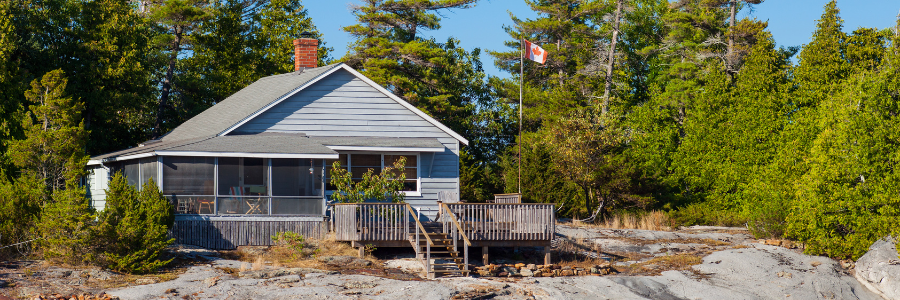For many Haliburton cottage owners, leveraging their property for short-term rentals through platforms like Airbnb or Vrbo has been a smart way to generate income, offset expenses, and maximize their investment. Who wouldn't want to make their slice of paradise work harder for them?
However, a recent ruling from the Tax Court of Canada has thrown a significant wrench into this strategy, creating a potential "tax trap" that could see you owing 13% HST on the entire sale price of your cottage when you decide to sell. Yes, even if it was once your cherished family retreat. This isn't about profit; it's about the very nature of your property in the eyes of the Canada Revenue Agency (CRA).
The implications are substantial, particularly for a region like Haliburton, where short-term rentals are booming. Understanding this shift is crucial for every cottage owner.
I. The Heart of the Matter: Understanding the CRA's New Stance
The core of this unexpected tax liability lies in how the CRA now classifies properties used for frequent short-term rentals.
A. From "Residential Complex" to "Commercial Enterprise"
Traditionally, the sale of a "residential complex" by an individual in Canada is exempt from HST. This exemption generally applies to your primary residence or a long-term rental property. The logic is that these are personal or traditional housing uses, not commercial ventures.
However, the Tax Court's decision, notably the case of 1351231 Ontario Inc. v. The King, clarified that properties used frequently and consistently for short-term rentals, with stays typically less than 60 days, are no longer considered a "residential complex" under the Excise Tax Act. Instead, the CRA deems them to operate as a commercial activity, like a hotel, motel, inn, boarding house, or similar premises. This reclassification, even if your property's municipal zoning remains residential, is the critical trigger.
B. The "60-Day Rule" and "All or Substantially All"
The CRA's focus is on the nature of the activity at the time of sale. Key indicators of this commercial classification include:
- Short-Term Stays: If your property's leases are predominantly for less than 60 consecutive days, it strongly signals commercial intent. Think weekend getaways, weekly vacation rentals, or short-stay bookings.
- "All or Substantially All": The court emphasized that if "all or substantially all" (generally interpreted as 90% or more) of the leases at the time of sale are for less than 60 days, it significantly bolsters the argument that the property is commercial. The CRA doesn't look at the entire ownership history, but rather the property's use at the point of disposition.
- Tip - you MUST block at least half of the available dates in the calendar (183+) for personal use, and never write off more than 45% of the carrying costs and expenses against the rental income. Keeping more than 50% of the cottage use personal helps with the cottage status. It’s not enough to say that more than half of the dates remained unbooked and you used them personally, you must be able to show the dates were actually blocked from booking.
C. The Impact: 13% HST on the ENTIRE Sale Price
Because your property is reclassified as commercial, its sale becomes a taxable supply. This means that when you sell, you could be obligated to collect and remit 13% HST (the rate in Ontario) on the property's full market value, not just any profit you might make.
Imagine your beautiful Haliburton cottage, purchased years ago for $500,000, is now valued at $800,000. If deemed a commercial property at sale, that could mean an additional $104,000 in HST ($800,000 x 13%) for which you, as the seller, are liable. This substantial and often unexpected burden can significantly erode your net proceeds. Essentially, it could eliminate any rental income benefit!
II. Debunking the "It's Just My Cottage!" Argument
We hear you. The frustration is understandable. It feels counterintuitive that your beloved cottage in a residential zone could suddenly be subject to commercial taxation.
A. Zoning vs. Tax Law: A Crucial Distinction
You're correct that your property's municipal zoning might be strictly residential. However, the CRA's interpretation under the Excise Tax Act operates independently of municipal zoning bylaws. The CRA is focused on the economic activity conducted on the property. If that activity resembles a commercial enterprise (like a hotel), they will apply commercial tax rules, regardless of what your municipality calls it. Think of it this way: a small business can be operated from a residential home, but its income and transactions are subject to business tax laws.
B. The "Money Grab" Perspective
It's easy to view this as another government "money grab," especially when property owners are simply trying to make ends meet or supplement their income in the face of rising costs. Many Haliburton residents rely on seasonal rentals to help cover cottage expenses.
From the government's perspective, however, this ruling aims to create a level playing field. Traditional hotels and motels must collect and remit HST on their services and sales. The CRA's position is that if a residential property is operating in a similar commercial manner, it should be subject to identical tax obligations to ensure fairness across the accommodation sector and prevent perceived loopholes.
C. Intent vs. Reality: How Consistent Use Changes Everything
While your initial intent might have been personal enjoyment with occasional rentals, the CRA views the property's primary function as commercial if the actual use becomes consistent, such as frequent short-term rentals. The "reality" of its use leading up to the sale dictates its tax status.
III. Navigating the Waters: Strategies to Mitigate HST Risk
The good news is that there are strategies to mitigate or avoid this significant HST liability. These strategies primarily revolve around changing the property's use before a sale.
A. Reverting to Residential Use (Primary Residence)
If you have used your Haliburton cottage as a short-term rental, moving back into it and establishing it as your primary residence for a significant period before listing it for sale can be an effective strategy. The longer the period of personal occupancy, the stronger your argument that the property has reverted to a residential complex, potentially qualifying for the HST exemption on sale. This also ties into the Principal Residence Exemption for capital gains, though the HST rules are distinct.
B. Embracing Long-Term Rentals
Another viable option is to transition your property to long-term rentals. This means consistently securing leases for periods of 60 days or more. Demonstrating a sustained history of long-term tenancy leading up to the sale, you can re-establish the property's status as a "residential complex" for HST purposes, making its sale exempt. The timing and duration of this switch are crucial, so planning is key.
C. Understanding HST Registration and ITCs (Briefly)
If you were already registered for HST (e.g., because your short-term rental revenue exceeded $30,000 in 12 months) and claimed Input Tax Credits (ITCs) on the purchase or improvements of your property, the situation becomes more complex. When a property's use changes from commercial (short-term rental) to residential (personal use or long-term rental), there can be a "change-in-use" deemed sale for HST purposes at fair market value, potentially triggering an HST liability at that point. This is where professional tax advice is essential.
D. Diligent Record-Keeping: Your Best Defense
Regardless of your strategy, meticulous record-keeping is paramount. Maintain detailed records of:
- All rental periods (start and end dates).
- The length of each stay.
- Gross rental income generated.
- Periods of personal use.
- Have any licenses or permits been obtained for short-term rentals?
This documentation will support your claim regarding the property's primary use at the time of sale.
IV. Special Considerations for Haliburton Cottage Owners
This ruling has a straightforward impact on our beautiful Haliburton region.
A. High-Value Properties & Significant HST Liability
With many Haliburton cottages being significant investments, the 13% HST on the full sale price can amount to hundreds of thousands of dollars. This isn't a minor deduction; it's a significant financial consideration that could drastically alter your net proceeds from a sale.
B. Common Use Case in Cottage Country
Short-term rentals are a common and vital part of the Haliburton cottage economy. Many owners have innocently participated in this market without realizing the potential tax implications upon sale. This makes proactive education and planning even more critical for our community.
C. Planning for Sale
If you're considering selling your Haliburton cottage in the next few years and have been using it for short-term rentals, start planning now. A well-thought-out transition period, shifting to long-term rentals or increasing personal use, could save you a substantial amount in HST.
V. Don't Go It Alone: Seek Professional Guidance
Navigating Canadian tax law, especially regarding real estate and changing property use, is incredibly complex. The specifics of your situation will determine the best course of action.
- The Complexity of Tax Law: Tax rules are nuanced and highly fact-specific. What applies to one situation may not apply to another.
- The Value of Expert Advice: We cannot stress the importance of consulting with qualified professionals. A real estate lawyer can help you understand the legal implications of a sale and how property use affects contracts. A tax accountant specializing in Canadian real estate is essential to clarify your specific HST obligations, advise on mitigation strategies, and ensure compliance with CRA regulations.
- Haliburton Gold Group's Commitment: As your local Haliburton real estate experts, we are here to guide you through the selling process. While we cannot provide tax advice, we can connect you with trusted local real estate lawyers and tax professionals who understand the nuances of this ruling and its impact on cottage country properties.
Conclusion
The recent Tax Court ruling serves as a vital wake-up call for Haliburton cottage owners engaged in short-term rentals. What was once seen as a straightforward way to earn income could now carry a significant HST liability upon sale.
Understanding these implications before you decide to sell is paramount. Don't let an unexpected tax bill diminish the value of your cherished Haliburton property.
Are you considering selling your Haliburton cottage? Contact the Haliburton Gold Group today. We'll help you understand the market, connect you with the right professionals, and ensure you're well-informed.
Learn More












